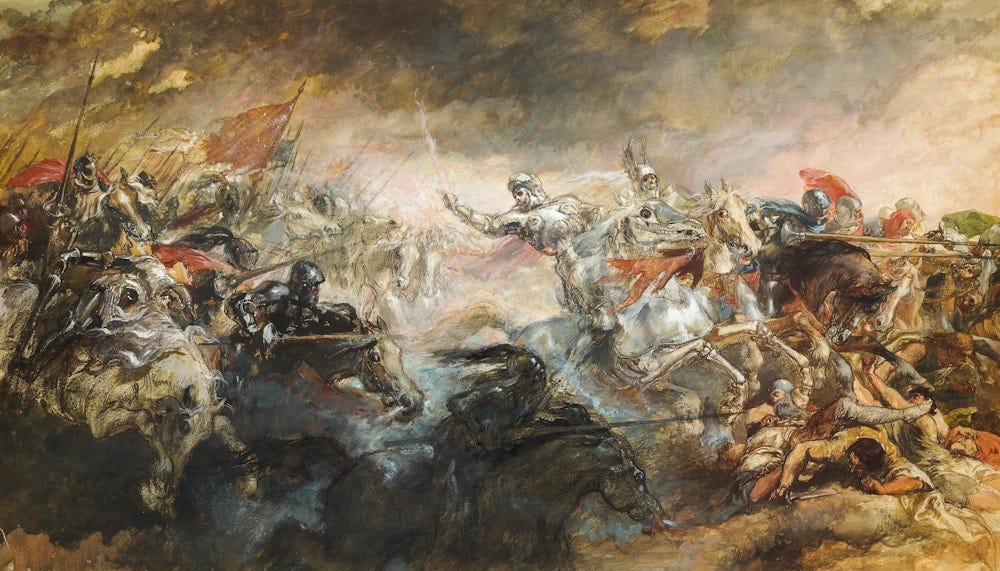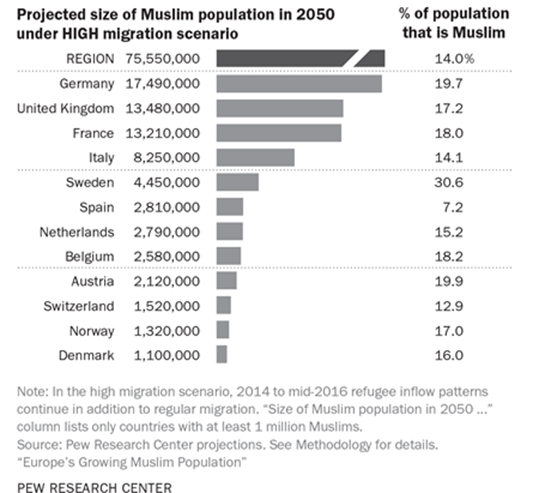S
Subhash Kak
Guest

The Phantom Horseman, 1870–93 by Sir John Gilbert (d. 1897)
The Pew Research Center estimates that by 2050 Europe’s Muslim population in several countries will approach 20%, and for Sweden the figure may be as high as 30%. While one may celebrate it as a sign of diversity, history informs us that such percentages are likely to trigger social and political conflict, and even war.

The word Islam means submission and in it the believers are enjoined to follow the Shari’ah (Islamic law), wherein lies the call for an unceasing conflict with the non-believers.
It is true that many other religions also have books that speak of violence, but leaders of these other religions have generally disavowed the material that is offensive to the spirit of modernity, and this has not occurred in Islam.
Below are some main points from an excellent summary of Islamic law prepared by the US military (I have not changed the spelling convention used in this document), which highlight the theological beliefs that lead to extremist behavior [Ref 1].
Framework for Shari’ah (Islamic Law)
Islam defines itself as a complete way of life — social, cultural, religious, military, and political — governed by Islamic Law (Shari’ah). The Shari’ah is primarily derived from the Qur’an and the Sunnah (the collection of the Hadith and sayings about the prophet’s life).
There are hundreds of thousands of Hadith, which have been evaluated by Islamic Legal Scholars (Jurists) as to their validity based on their chain of transmission from the Prophet to the reporting author. The Hadith are categorized as mawdu (false), munkar (ignored), da’if (weak), hasan (good), sahih (sound), and mutawatir (strongest, most rigorously authenticated).
There are six primary Hadith and they are, in rank order, Bukhari, Muslim, Abu Dawud, ai-Sugra, Tirmidhi, and Ibn Majah, of which the first two (Bukhari and Muslim) are considered the most reliable. In Islamic Law, Mutawatir Hadith from Bukhari rises to the level of being second only to the Qur’an.
Dar al Harb / Dar al Islam
In Islamic Law, the entire world is divided into the Dar al Harb, “the house or abode of war,” and the Dar al Islam, “the house or abode of peace.”
All lands which are not under Muslim control and ruled by Shari’ah, are considered Dar al Harb — enemy lands. All non- Muslims, not submitted to Islamic Law in Muslim lands are considered “enemy persons, persons from the territory of war.” The term “non-combatants” does not exist in Islamic Law. All lands occupied by Muslim forces at any time in history are considered “Muslim Lands.”
Relations with non-Muslims
It is a permanent command in Islam for Muslims to hate and despise Jews and Christians and not take them as friends. This comes from both the Qur’an as well as from the sacred hadith scholars Bukhari and Muslim.
The Prophet said, “The hour [of judgment] will not come until the Muslims fight the Jews and kill them. it will not come until the Jew hides behind rocks and trees. it will not come until. the rocks or the trees say, ‘0 Muslim! 0 servant of God! There is a Jew behind me. Come and kill him.’” [Sacred Hadith, Bukhari, 103/6, number 2926]
Jihad
Jihad is a permanent obligation on the Muslim community until the entire world is made the Dar al Islam.
Islamic Law provides three options for ‘People of the Book’ (those who had a holy book prior to Muhammad): (1) They may convert to Islam; (2) they may be killed; or (3) they may pay the jizya (non-Muslim tax) and be subjugated to Islamic Law having little rights as non-Muslims under the law.
Pagans and others who had no holy book prior to Muhammad must either convert to Islam or be killed.
Slander and apostasy
in Islamic Law, anyone who criticizes a Muslim, Islam, or the Prophet is guilty of slander. The punishment for slander in Islamic Law is death.
Apostasy is when a Muslim leaves Islam. This is a capital crime and is punishable by death. There is a requirement for the Muslim to be advised of his error before he is killed.
The Koranism reform advocated by MBS
A good sign is that the current ruler of Saudi Arabia, Mohammad bin Salman, is in favor of fundamental reform and discarding most of the hadith and other post-Qu’ran material. He speaks of the need for a new contemporary “interpretation” of the Koran (the alternate spelling “Koran” has been used in reports on MBS). In the reformed version of Islam, there will be no more stoning, scourging, killing apostates and homosexuals.
The reformed version is being called Koranism; it is a view that rejects the authority of the hadiths and supports the idea that interpretations of Koranic texts should be consistent with scientific knowledge, humanism, and values of the host culture. Koranism is in favor of each country having its own Islam that is assimilated into the host culture.
According to MBS, “The government, where Sharia is concerned, has to implement regulations and teachings based on mutawatir hadith (with multiple narrators), and to look into the veracity and reliability of ahad hadiths (with only one narrator), and to disregard khabar hadiths (based on hearsay) entirely.” [Ref 2]
MBS presents a powerful argument. He says that if modern Muslims continue to be guided by scholars and jurists of the olden times, they are then privileging or even deifying human beings. He is thus arguing for a direct connection between God and man, wherein the individual retains the agency to reach his or her own understanding.
I think there will be inter-religious harmony if the Islamic world adopts MBS’s reforms. But there is no certainty that this will happen, and the Islamic world itself most likely will have conflict between its sects. But the reforms advocated by MBS will become a catalyst for change.
If nothing is done, change may be forced on Islamic society as has happened in Xinjiang.
It is possible that Europe will use massive surveillance to nab bad actors to keep peace. But that will succeed only so long the number of such actors is small.
After massive demographic transformation, Muslims may wish to carve out separate lands for themselves in Europe, and there may transfer of population as happened during India’s Partition.
References
1. Executive Services Directorate of US DoD document on Islam
2. Mohammed Bin Salman’s proposed reforms
Continue reading...
